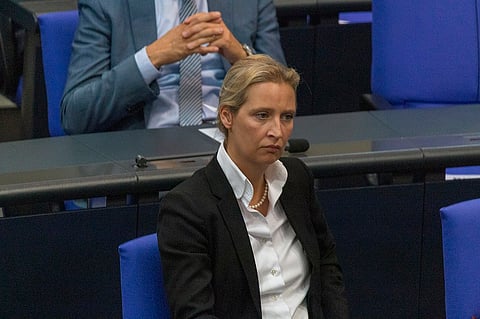

Germany’s domestic intelligence service has temporarily withdrawn its recent classification of the far-right Alternative for Germany (AfD) party as a confirmed extremist organization, following a legal challenge by the party.
The Federal Office for the Protection of the Constitution (BfV) announced last week that it had gathered “definitive evidence” the AfD seeks to undermine Germany’s democratic order. However, just six days later, the agency informed an administrative court in Cologne that it would suspend the designation while legal proceedings are ongoing.
For now, the AfD will revert to being monitored as a “suspected case”—a lower-tier classification that still permits surveillance but under stricter judicial oversight.
The abrupt reversal came after the AfD filed an urgent legal challenge, accusing the outgoing government of orchestrating a politically motivated smear campaign before leaving office. The BfV did not explain its sudden shift in its court filing.
The agency’s original decision—reportedly based on a 1,000-page internal analysis—marked a historic first: Never before had a party with full representation in the Bundestag been formally labeled a confirmed right-wing extremist organization. Such a designation would have allowed expanded surveillance, including the use of informants.
The backtracking is expected to fuel debate over whether the AfD, which currently leads national polls, should face a formal ban. Party leaders Alice Weidel and Tino Chrupalla framed the classification as an attempt to discredit them ahead of a government reshuffle, vowing, “We will keep fighting this in court.”
A BfV spokesperson confirmed the agency will refrain from publicly referring to the AfD as a “confirmed right-wing extremist movement” until the court rules on the party’s injunction request. Measures tied to the classification, including enhanced surveillance, have also been suspended.
The move allows the BfV to avoid a potential court order forcing a retraction, which the AfD could have used to claim victory. The injunction is separate from the party’s broader appeal against the classification, which may take months or years to resolve.
Last week’s decision drew criticism from some U.S. officials, including Secretary of State Marco Rubio, who called it “tyranny in disguise.” Germany’s Foreign Ministry defended the move as necessary to uphold constitutional order.
While the BfV’s plans are paused, they have not been abandoned. The agency previously took similar steps in July 2023 when it classified the AfD’s youth wing as extremist—a designation that remains in place.
The AfD, which finished second in Germany’s February elections, has faced growing scrutiny over its anti-immigrant rhetoric, including statements such as, “Every additional foreigner in this country is one too many.” German officials deny political motivations behind the probe, citing the party’s “ongoing agitation” against minorities.
The case continues to unfold as Germany’s new conservative-led government, under Chancellor Friedrich Merz, takes office, replacing the previous Social Democrat-led coalition.